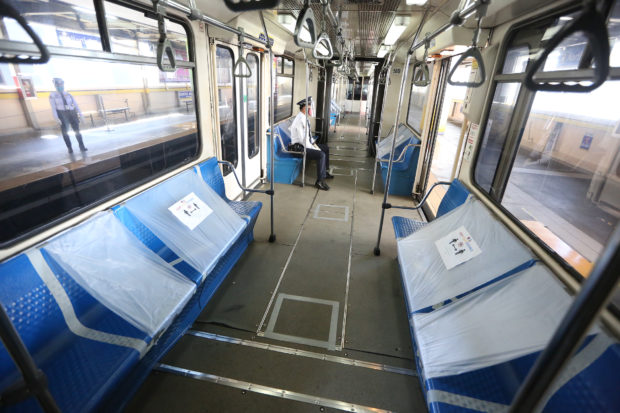Some jeepneys, UV Express vans may be allowed to operate

MORE BREATHING SPACE, TOO Where before coaches were packed like sardines, commuters will have more leg room and space between them when trains resume operations today at a reduced capacity under general community quarantine in Metro Manila. —NIÑO JESUS ORBETA
MANILA, Philippines — Some jeepneys and UV Express vans may be allowed to operate even during the first three weeks of the phased return of public transportation in Metro Manila, which exits from strict coronavirus quarantine on Monday.
In a radio interview on Sunday, Transportation Undersecretary Mark de Leon said that while jeepneys and UV Express vans are considered high risk for coronavirus transmission, they may be allowed to return to the streets if the public utility vehicles (PUVs) qualified to operate during the epidemic are not enough to transport the millions of workers returning to their jobs after the three-month lockdown.
Jeepneys and UV Express vans are considered high risk, he said, “because they are not equipped with the tap card (electronic fare collection) system.”
“The implementation of health [measures in] them will be very difficult. They may even be vectors [for coronavirus] transmission,” De Leon said.
Cashless fare system
Martin Delgra, head of the Land Transportation Franchising and Regulatory Board (LTFRB), said that under the guidelines for the operation of public utility vehicles during the epidemic, only taxis, buses and jeeps capable of cashless fare payment qualify for the special permit to operate.
To enforce the requirement, he said, the LTFRB has partnered with digital wallet apps GCash, PayMaya, Squidpay and AF Payments, the concessionaire for the beep cards used on the three metro trains.
Delgra urged the public to use these apps, as taxis and ride-hailing company cars are already capable of the cashless fare system.
Commuters should expect to be asked for contact information, as public utility vehicle operators are required to keep daily passenger records for contact tracing.
They should wear protective masks throughout the ride and observe physical distancing.
The LTFRB has authorized 4,438 taxis and 18,629 ride-hailing company cars to operate in Metro Manila from June 1 to 21, the first phase of the return of public transportation to support the gradual reopening of businesses in the metropolis.
From June 1 to 15, the three metro trains — LRT Lines 1 and 2 and the MRT 3 — and the Philippine National Railways are returning to service with only 10-15 percent of their normal capacity.
About 300 buses, allowed to carry only 50 percent of their normal capacity, will be deployed to the trains’ routes to carry commuters who will miss the metro ride due to the capacity limit.
Also allowed to operate are point-to-point buses, shuttle services and tricycles.
The second phase starts on June 21, when city buses, UV Express vans and the so-called modern jeepneys — minibuses designed to replace the iconic jeepney—will be allowed to operate.
Catastrophe
Officials said earlier that they were looking for ways of enforcing public health rules on jeepneys so that these vehicles, which run round the clock on routes not served by buses, could be allowed to return to service.
The commuter group AltMobility PH has warned that without jeepneys and buses, commuting in Metro Manila would be catastrophic.
According to a Japan International Cooperation Agreement report, there were around 35 million trips in Metro Manila before the coronavirus outbreak.
Even assuming that only 30 percent of these trips will resume with the loosening of quarantine restrictions, that’s still equal to 10.5 million trips that need to be served by active public transport, AltMobility chair Jedd Ugay said.
Extending the ban further could only harm both workers who cannot afford to buy bicycles and cars and the small and medium businesses that cannot afford to shuttle service to their employees, he said.
The Department of the Interior and Local Government, meanwhile, told local governments to designate bike lanes along roads for the safety of workers using bicycles to go to work.
The agency tasked officials of town and city officials to work together to build interconnecting bike lanes and networks.
Motorcycle taxis remain prohibited, the agency said.
—WITH REPORTS FROM JEANNETTE I. ANDRADE AND KRIXIA SUBINGSUBING
For more news about the novel coronavirus click here.
What you need to know about Coronavirus.
For more information on COVID-19, call the DOH Hotline: (02) 86517800 local 1149/1150.
The Inquirer Foundation supports our healthcare frontliners and is still accepting cash donations to be deposited at Banco de Oro (BDO) current account #007960018860 or donate through PayMaya using this link.














